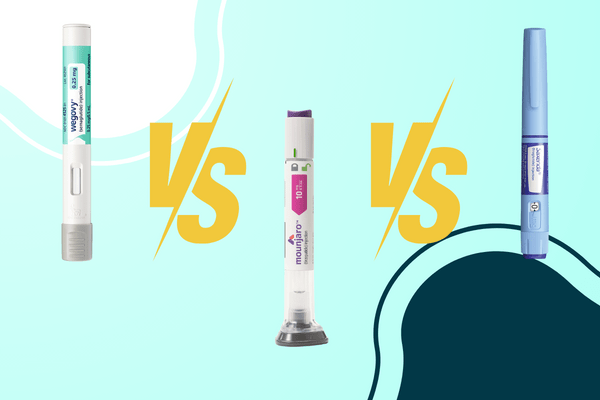There are many new weight management medications available for people to be prescribed. Each medication has varying effectiveness on the amount of weight a person may lose. However, like any other medication, there is also a list of potential risks attached to the medication. In this blog, we will discuss the new weight management medication called Mounjaro (tirzepatide).
What is Mounjaro (tirzepatide)?
Mounjaro® has been authorised for weight management use in the UK. The approval for weight management also comes from the US Food and Drugs Administration (FDA) as well as the Medicines and Healthcare products Regulatory Agency (MHRA).
Mounjaro® (tirzepatide) is an injectable prescription medicine that is used along with diet and exercise to improve blood sugar (glucose) in adults with type 2 diabetes mellitus. It is a dual-acting incretin mimetic that works by mimicking the effects of two natural hormones, glucose-dependent insulinotropic polypeptide (GIP) and glucagon-like peptide-1 (GLP-1). GIP and GLP-1 help to control blood sugar levels by increasing insulin secretion, slowing gastric emptying, and suppressing glucagon secretion.
How does it compare with other medications?
Research and trials have shown that tirzepatide has been more effective compared to other medications in its class such as semaglutide and liraglutide. The trials show that over a 72 week period, 96% of participants lost at least 5% of their body fat.
However, efficacy of both medications will also rely on the healthy lifestyle changes made by the person. Making sure the right dietary changes are made along with regular physical activity will ensure you achieve the best results possible when on these medications.
What are the potential side effects of the medications?
Both tirzepatide and semaglutide have similar side effects which a person may experience. Many of these could be linked to the person’s diet, not drinking enough water or other factors such as being ill.
Here is a list of the potential side effects one may experience:
- Vomiting
- Fatigue
- Headaches
- Diarrhoea
- Abdominal pain
- Nausea
- Constipation
- Injection site reactions
Before starting these medications, it is important to always read the Patient Information Leaflet provided to learn about the potential side effects.
If the side effects worsen and you are unable to tolerate further, please seek medical advice immediately with your doctor or go to your nearest A&E.
Does Tirzepatide have higher risks compared to semaglutide?
The risks of tirzepatide are similar to semaglutide. Both medications work in similar ways and affect the GLP-1 hormone in the body. The below snippet is from the National Library of Medicine (NLM).
Participants who experienced any adverse events accounted for 87.6% with semaglutide 2.4 mg, 81.8% with semaglutide 1 mg, and 76.9% with placebo in STEP 2.12 The proportion of any adverse events for tirzepatide 15 mg was 63.6% compared to 66.1% for placebo in SURPASS-1.15 In SURPASS-2, 68.9% and 64.2% of patients with tirzepatide 15 mg and semaglutide 1 mg, respectively, reported any adverse events.16 In all trials, gastrointestinal events were the most common adverse events.
These were mostly tolerable and occurred temporarily in the early phases of the trials.12,15,16 The composite gastrointestinal events and nausea occurred more frequently with semaglutide 2.4 mg and tirzepatide 15 mg compared to placebo (proportion of all gastrointestinal events and nausea, 63.5% and 33.7%, respectively, for semaglutide 2.4 mg vs. 34.3% and 9.2%, respectively, for placebo in STEP 2; and 41.3% and 18.2%, respectively, for tirzepatide 15 mg vs. 19.1% and 6.1%, respectively, for placebo in SURPASS-1).
Source: https://www.ncbi.nlm.nih.gov/pmc/articles/PMC8987449/
Above shows that side effects were only temporary between the 2 active ingredients and were mostly tolerable by the participants. Side effects such as constipation, nausea etc. can be treated with dietary changes or over the counter medications.
Should anyone not take tirzepatide?
There are several reasons why you might not be able to take Mounjaro® (tirzepatide). Some reasons why you may not be approved for Mounjaro® could be related to your current medications, if you are pregnant or breastfeeding or your kidney function.
It is very important to undergo a medical assessment to make sure you will be 100% safe when taking Mounjaro so that you don’t suffer from any serious side effects or cause any damage to your health.





